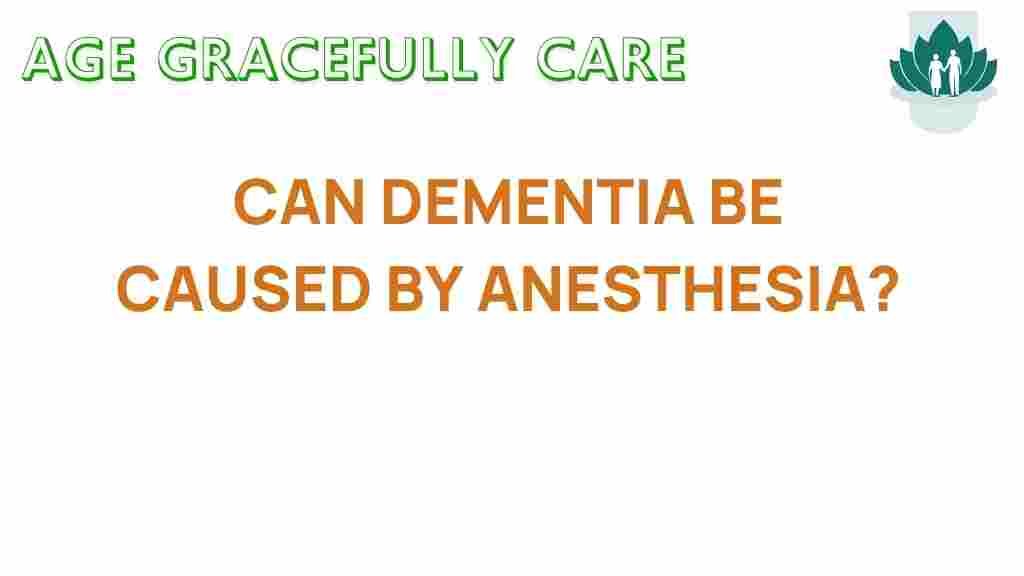Unraveling the Mystery: Can Anesthesia Trigger Dementia?
The connection between anesthesia and dementia has become a hot topic in medical research, particularly as our population ages. With increasing numbers of surgeries performed annually, understanding the potential neurological impacts of anesthesia on brain health is essential for patient safety. This article explores the relationship between anesthesia and cognitive decline, aiming to provide clarity on how these two factors may be interrelated.
Understanding Dementia and Cognitive Decline
Dementia is a broad term that encompasses various conditions characterized by a decline in cognitive function, affecting memory, thinking, and social abilities significantly enough to interfere with daily life. The most common form of dementia is Alzheimer’s disease, but other types include vascular dementia, Lewy body dementia, and frontotemporal dementia.
As we age, the risk of developing dementia increases, with factors such as genetics, lifestyle, and health conditions playing a crucial role. Understanding cognitive decline is vital for recognizing early symptoms and seeking appropriate medical interventions.
The Role of Anesthesia in Medical Procedures
Anesthesia is a medical intervention used to prevent pain during surgical procedures. It can be administered in various forms, including local, regional, and general anesthesia. While anesthesia is generally considered safe, it is not without risks, particularly for older adults.
Several types of anesthesia can affect brain health differently:
- General Anesthesia: This type induces a temporary state of unconsciousness and is commonly used for major surgeries.
- Regional Anesthesia: Involves injecting anesthetic near a group of nerves to numb a specific area of the body.
- Local Anesthesia: Used to numb a small area, allowing the patient to remain awake during minor procedures.
The Link Between Anesthesia and Dementia: Insights from Medical Research
Recent studies have begun to unravel the potential links between anesthesia and cognitive decline, particularly in older patients. The following points summarize key findings from medical research:
- Postoperative Cognitive Dysfunction (POCD): Some studies indicate that patients, especially the elderly, may experience temporary cognitive decline after surgery, known as POCD. This condition can include memory deficits and difficulties in attention and problem-solving.
- Long-Term Effects: While most patients recover fully, a subset of individuals may experience long-term cognitive issues, raising concerns about the potential role of anesthesia in the development of dementia.
- Inflammatory Response: Anesthesia may trigger an inflammatory response in the brain, which is associated with the progression of neurodegenerative diseases, including dementia.
Age as a Risk Factor
The aging process itself is a significant risk factor for both anesthesia-related complications and dementia. Older adults often have pre-existing cognitive impairments, making them more susceptible to the adverse effects of anesthesia. The combination of aging and anesthesia poses unique challenges in terms of patient safety.
Postoperative Effects: What to Expect
After undergoing anesthesia, patients may experience a range of postoperative effects. Understanding these effects can help manage expectations and promote better recovery:
- Short-Term Confusion: Some patients may feel disoriented or confused immediately after waking from anesthesia.
- Memory Issues: Temporary memory lapses can occur, affecting short-term recall.
- Fatigue: It is common to feel tired or sluggish for several days following surgery.
Monitoring Brain Health Post-Surgery
To ensure optimal recovery and brain health, it is essential to monitor cognitive function after surgery, especially in older adults. Here are some steps to consider:
- Regular Assessments: Engage healthcare providers for cognitive assessments post-surgery to identify any changes.
- Stay Engaged: Encourage mental activities, such as puzzles or reading, to stimulate cognitive function.
- Healthy Lifestyle Choices: Promote brain health through a balanced diet, regular exercise, and social interactions.
Troubleshooting Tips for Concerns About Anesthesia and Dementia
If you or a loved one is concerned about the potential risks of anesthesia and dementia, consider the following troubleshooting tips:
- Communicate with Your Medical Team: Discuss any concerns regarding anesthesia with your anesthesiologist or surgeon. They can provide personalized information based on medical history.
- Consider Anesthesia Alternatives: In some cases, local or regional anesthesia may be an option, reducing the risks associated with general anesthesia.
- Preoperative Assessments: Undergoing cognitive and physical assessments before surgery can help identify potential risks and tailor the anesthesia plan accordingly.
Conclusion: Ensuring Patient Safety Amidst the Anesthesia-Dementia Debate
As the medical community continues to explore the relationship between anesthesia and dementia, it is crucial for patients, caregivers, and healthcare providers to remain informed. While research suggests potential risks, especially for the aging population, the benefits of anesthesia in ensuring successful surgical outcomes cannot be overlooked.
Maintaining brain health post-surgery is essential, and proactive steps can be taken to monitor cognitive function and promote recovery. By engaging in open communication with medical professionals, patients can make informed decisions that prioritize their safety and well-being.
For further reading on dementia and cognitive health, you can visit Dementia.org. Additionally, for insights into medical research regarding anesthesia, check out NEJM.org.
Ultimately, understanding the complexities of anesthesia and its potential impact on brain health will empower patients to navigate their healthcare journeys with confidence.
This article is in the category Health and created by AgeGracefullyCare Team
